Physical Address
304 North Cardinal St.
Dorchester Center, MA 02124
Physical Address
304 North Cardinal St.
Dorchester Center, MA 02124
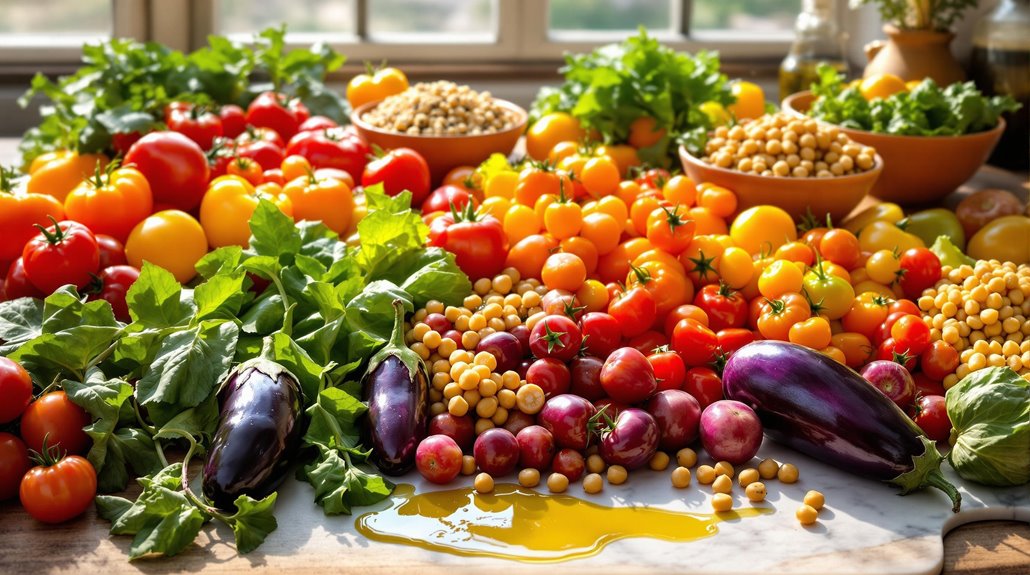
A vegan diet offers remarkable benefits for your health and the planet. You'll reduce your risk of heart disease by up to 32%, strengthen your immune system, and achieve clearer skin through antioxidant-rich foods. Plant-based eating helps manage weight, prevents diabetes, and cuts greenhouse gas emissions by 75%. You'll save nearly 1 million liters of water annually while supporting animal welfare and sustainable agriculture. These compelling reasons are just the beginning of your plant-based journey.
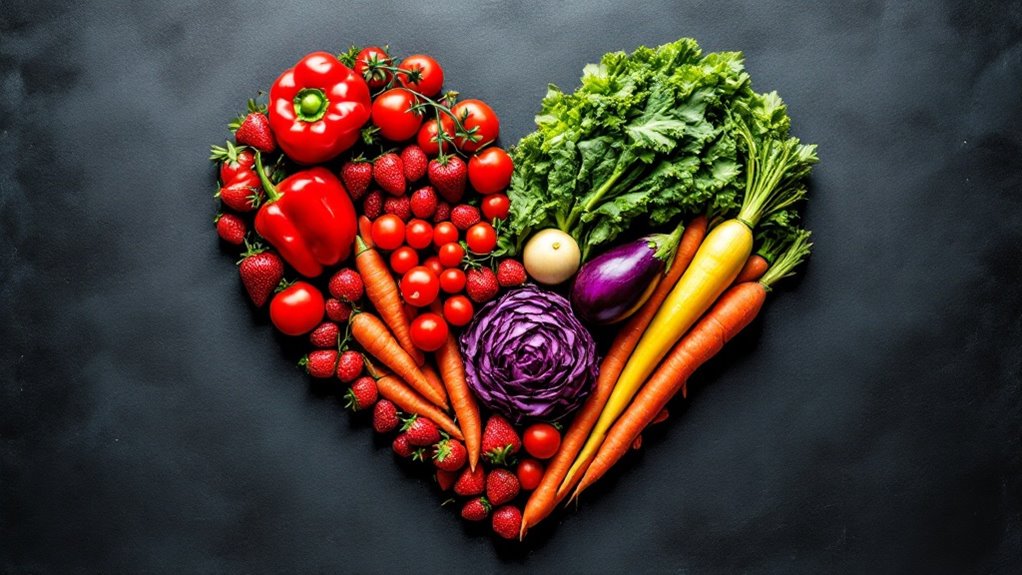
While many people seek medical interventions to prevent heart disease, adopting a vegan diet offers a natural and effective approach to protecting your cardiovascular health.
When you switch to plant-based eating, you'll eliminate dietary cholesterol while reducing your LDL levels by 10-15% through lower saturated fat intake. You'll also benefit from increased fiber consumption, as whole plant foods provide 25-40g daily, improving your lipid metabolism. Plant-based alternatives can provide all essential nutrients while promoting optimal heart function.
The evidence is compelling: plant-based eaters show a 19% lower cardiovascular disease risk compared to omnivores, and vegetarians demonstrate a 32% reduction in coronary heart disease mortality. Studies consistently demonstrate that vegetarian and vegan diets improve glycemic control and body weight management. Even while traveling, discovering hidden vegan gems in global cuisine can help maintain heart-healthy eating habits. Major European cities are leading the way with extensive plant-based dining options that make heart-healthy eating more accessible than ever. Vietnam offers vegan-friendly cuisine that perfectly aligns with heart-healthy dietary choices.
Components of a vegan diet, such as nuts and soy products, can reduce your LDL cholesterol by up to 35%, while the potassium-rich foods help regulate blood pressure naturally.
Beyond improving your overall health, adopting a vegan diet can transform your skin's appearance through its abundance of antioxidant-rich foods.
You'll discover powerful skin-protecting compounds in colorful plant foods like leafy greens, berries, and tomatoes, which combat free radical damage and reduce visible signs of aging. Dark chocolate's flavonoids and catechins support skin hydration and elasticity for a more youthful look. These foods work together to enhance your skin's natural defense mechanisms, with vitamin C from citrus fruits boosting collagen production while vitamin E from nuts and seeds maintains your skin's moisture barrier.
Clinical studies show that plant-based diets can decrease visible wrinkles by up to 33%, while antioxidants from green tea help even out skin tone.
You'll also benefit from zinc-rich legumes that accelerate wound healing and omega-3 fatty acids from chia seeds that reduce inflammation linked to acne.
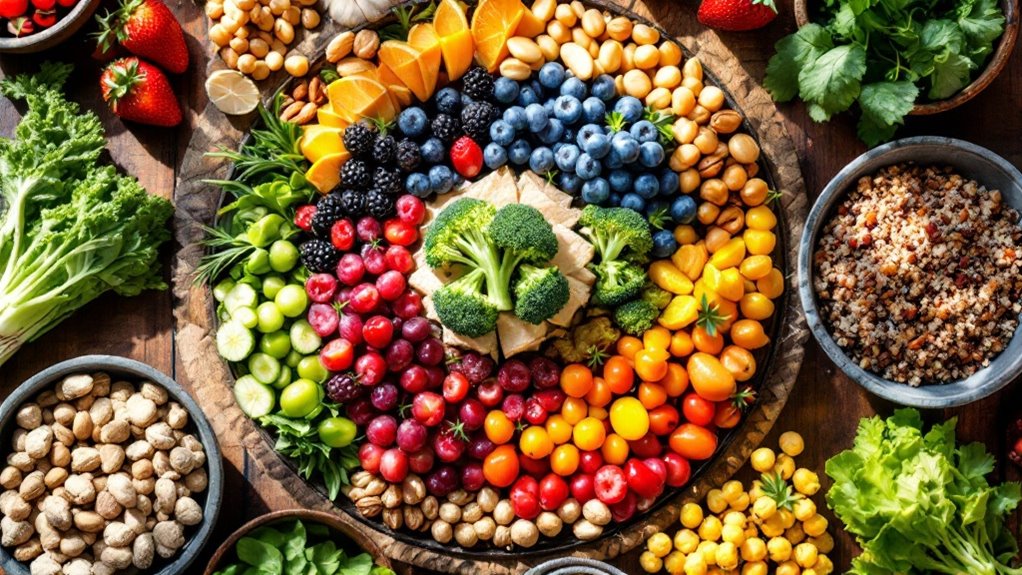
Through its unique effects on hormone regulation, a vegan diet offers powerful tools for managing your weight naturally and sustainably. The fiber-rich plant foods help stabilize your blood sugar while triggering key satiety hormones that keep you feeling full longer. The high levels of protective antioxidants in plant foods help combat stress and inflammation that can disrupt hormone balance.
| Hormone | Food Source | Benefit |
|---|---|---|
| GLP-1 | Legumes, Whole Grains | Improves insulin sensitivity |
| PYY | Leafy Greens, Vegetables | Extends post-meal fullness |
| CCK | Nuts, Seeds | Suppresses appetite |
You'll find that eating plant-based foods nurtures your gut microbiome, which plays an essential role in hormone balance and weight control. The diverse fiber sources feed beneficial bacteria that produce hormones regulating appetite and metabolism. Plus, plant-rich diets increase hormones that naturally suppress hunger while improving your body's insulin response. The vibrant South East Asian cuisine offers countless delicious ways to incorporate hormone-balancing vegan foods into your diet. The Northern Thai capital provides an abundance of fresh, locally-sourced vegetables perfect for hormone-optimizing meals. Siem Reap's vegan restaurants offer innovative plant-based dishes that support healthy hormone function. Tokyo's plant-based scene is rapidly expanding with numerous restaurants offering creative hormone-supportive meals.
Switching to a vegan diet represents one of the most impactful choices you can make to reduce your environmental footprint and combat climate change.
You'll cut your greenhouse gas emissions by up to 75% compared to a meat-heavy diet, while using 54% less water and 75% less land.
Every time you choose plant-based meals, you're helping preserve biodiversity and protecting essential ecosystems.
Each plant-based meal choice actively protects Earth's diverse species and vital ecosystems for future generations.
To put this in perspective, if you switch to a vegan diet, you'll reduce your daily carbon emissions from about 18 pounds to just 3.6 pounds – that's the equivalent of taking countless cars off the road.
Your dietary choice has more environmental impact than switching to an electric car or avoiding air travel, making it a powerful tool for planetary health.
The current food system contributes to 34% of all global greenhouse gas emissions, making dietary changes crucial for environmental protection.
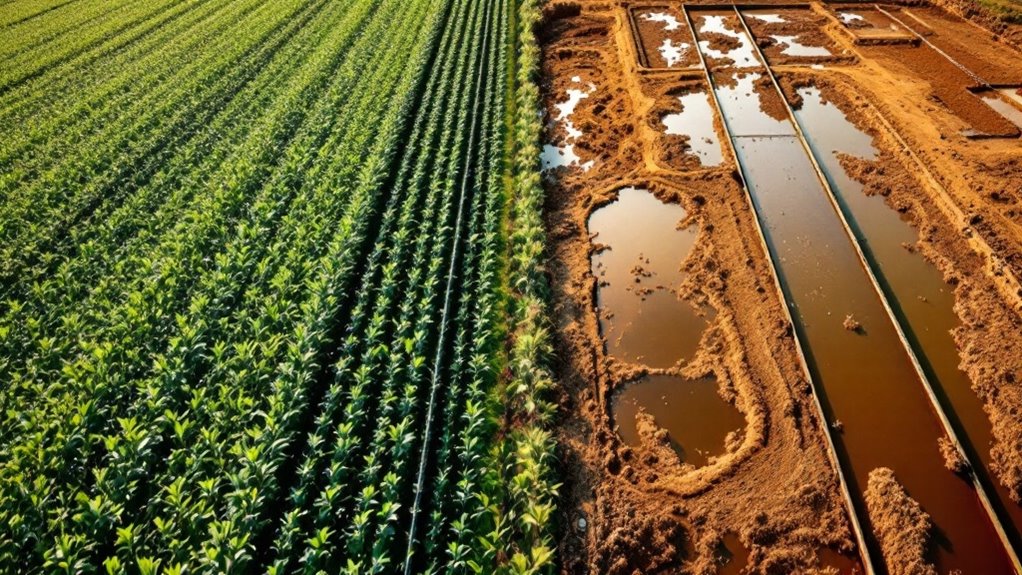
When you consider the staggering water footprint of animal agriculture, choosing a plant-based diet emerges as one of the most powerful ways to conserve Earth's precious water resources. You'll save approximately 1 million liters of water annually by switching to plant-based foods, as meat production demands exponentially more water than growing vegetables and legumes. Sustainable choices like high protein legumes offer excellent nutritional value while minimizing water usage.
| Food Type | Water Usage (per pound) | Environmental Impact |
|---|---|---|
| Beef | 1,800 gallons | High water pollution |
| Vegetables | 42 gallons | Minimal runoff |
| Tofu | 302 gallons | Low contamination |
As industrial fishing devastates marine ecosystems at an alarming rate, you'll discover that adopting a plant-based diet offers one of the most powerful ways to protect our oceans.
By avoiding seafood, you're helping prevent the annual capture of 2.7 trillion fish and 38 million tonnes of bycatch, while also reducing the massive destruction of coral reefs and ocean habitats caused by trawling.
Each year we save 2.7 trillion fish and protect vital ocean habitats by choosing plant-based alternatives to seafood.
Your choice to go vegan directly combats the agricultural pollution that creates deadly ocean dead zones and toxic algal blooms.
You'll cut your contribution to the fishing industry's devastating impact, including the 75% of coral reef plastic pollution that comes from abandoned fishing gear.
Marine protected areas show that when we leave oceans alone, marine life thrives – with biodiversity increasing by 21% in just three years. The Revillagigedo National Park demonstrates how fully protected areas can successfully coexist with sustainable fishing practices while preserving crucial marine habitats.

The devastating impact of animal agriculture extends far beyond our oceans into Earth's essential rainforest ecosystems, where the meat industry drives an astonishing 88% of global deforestation.
By choosing a vegan diet, you'll help protect these important habitats that house 10% of Earth's biodiversity and play an essential role in stabilizing our climate. Your dietary choices can directly prevent the annual destruction of 136 million acres of rainforest cleared for livestock and feed production. Cattle ranching and feed production release massive amounts of stored carbon as soil nutrients deplete rapidly.
By choosing a vegan diet, you'll take a powerful stand against one of today's most ethically troubling industries – factory farming, where over 70% of land animals endure extreme confinement and suffering.
You'll help combat a system where egg-laying hens spend their lives in cages smaller than a sheet of paper, and piglets undergo painful procedures without anesthesia.
Your choice directly opposes an industry that routinely violates animal welfare regulations and creates serious public health risks through antibiotic overuse and toxic emissions.
Plus, you'll stand against the environmental injustice of factory farms, which disproportionately impact low-income communities and communities of color through air and water pollution.
Every vegan meal you choose helps weaken a system that prioritizes profit over the wellbeing of animals, workers, and communities. Workers in these facilities often face poor working conditions that lead to physical injuries and mental health issues.
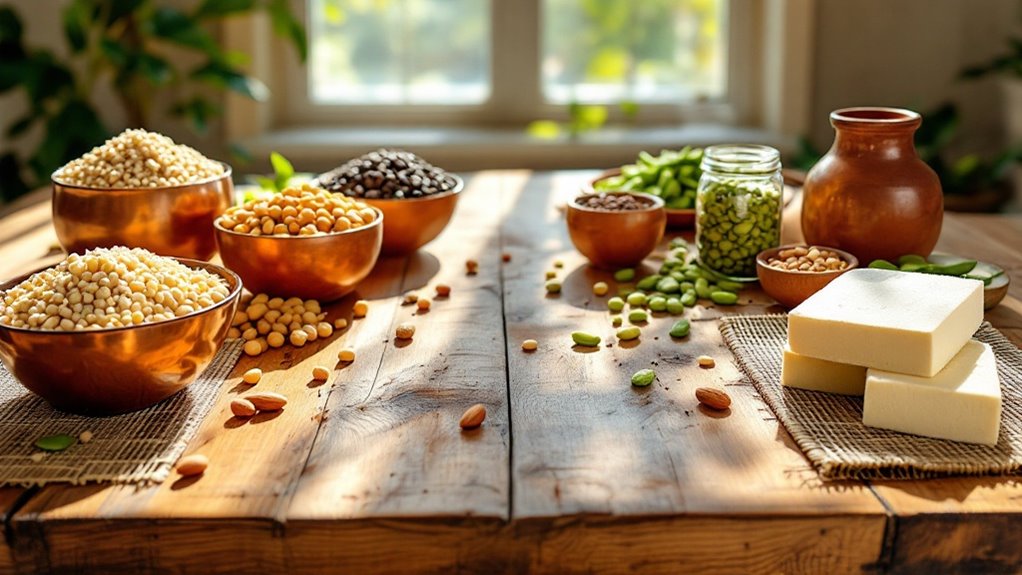
Misconceptions about protein deficiency often deter people from adopting a plant-based diet, but nature offers an abundance of complete protein sources.
Plant proteins are diverse and abundant in nature, dispelling the myth that a vegan diet leads to protein deficiency.
You'll discover all essential amino acids in quinoa, hemp seeds, and soy products, while strategic food pairings like rice with beans create complete protein profiles. In Plant-Based Bavaria, Munich's growing vegan scene showcases how traditional cuisine can embrace protein-rich alternatives. Hamburg's vegan restaurants are leading the way in innovative plant protein preparations. Berlin's fast food scene proves that quick, convenient meals can be both protein-rich and plant-based.
These plant-based options don't just match animal proteins – they often surpass them in overall nutrition. The versatile Ezekiel bread option delivers 8 grams of protein from sprouted grains and legumes in just two slices.
These protein-rich options contribute to lower heart disease risk and improved gut health while meeting your daily protein requirements through delicious, varied meals. Even in culinary hotspots like San Sebastian, you'll find innovative plant-based restaurants embracing these protein-packed ingredients.
Successfully adopting a plant-based diet requires understanding how to obtain essential nutrients that traditionally come from animal products.
You'll need to focus on key nutrients like vitamin B12, which you can get through fortified foods or supplements, taking 25-100 mcg daily.
For iron absorption, pair iron-rich foods like lentils and spinach with vitamin C sources such as citrus fruits and bell peppers. Most vegetarians receive adequate protein intake through legumes, nuts, seeds, and whole grains.
Guarantee adequate calcium by consuming fortified plant milks, tofu, and leafy greens, while supporting absorption with vitamin D from UV-exposed mushrooms. Kuala Lumpur's vegan scene offers numerous options for calcium-rich plant-based meals.
Don't forget omega-3s from chia seeds, flaxseeds, and walnuts, though you might want to take into account algae supplements for EPA/DHA. Lisbon's plant-based cafes are increasingly incorporating these nutrient-rich ingredients into their innovative menus. Bali's digital nomad community has embraced plant-based dining as part of their health-conscious lifestyle.
Finally, optimize zinc intake through legumes and pumpkin seeds, and maintain iodine levels with iodized salt or seaweed. Amsterdam's vegan food scene has made it easier than ever to maintain proper nutrition while following a plant-based diet.
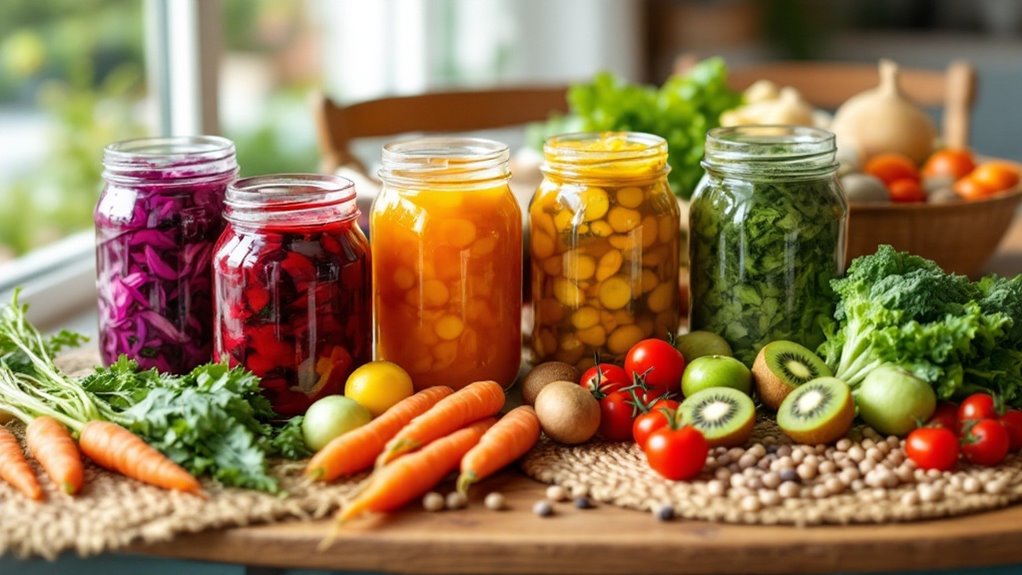
Research shows that adopting a vegan diet can dramatically reshape your gut microbiome, the complex ecosystem of trillions of bacteria living in your digestive system.
When you switch to plant-based eating, you'll cultivate beneficial bacteria that produce short-chain fatty acids, which help reduce inflammation and strengthen your gut barrier. Your microbiome will develop enhanced functional diversity as it adapts to breaking down various plant compounds. Vegans consistently score highest on the Healthful Plant-Based Index, demonstrating superior dietary quality compared to other eating patterns.
This transformation can begin within just 16 weeks of consistent vegan eating, leading to long-term improvements in your digestive health.
While plant-based eating eliminates many traditional food safety concerns, vegan diets come with their own unique set of food safety challenges that you'll need to navigate carefully.
If you have food allergies, don't assume vegan products are automatically safe, as they're often produced in facilities that process milk, eggs, and other allergens. Recent research shows 62% of consumers misunderstand vegan labeling as being safe for those with allergies.
You'll need to pay special attention to properly cooking and storing plant-based ingredients, since foods like rice, beans, and sprouts can harbor harmful bacteria.
Make sure you're heating your meals thoroughly to at least 165°F, and don't leave cooked grains at room temperature for more than two hours.
Remember that a vegan label isn't the same as an allergen-free certification, so always check ingredient lists and warning labels carefully.
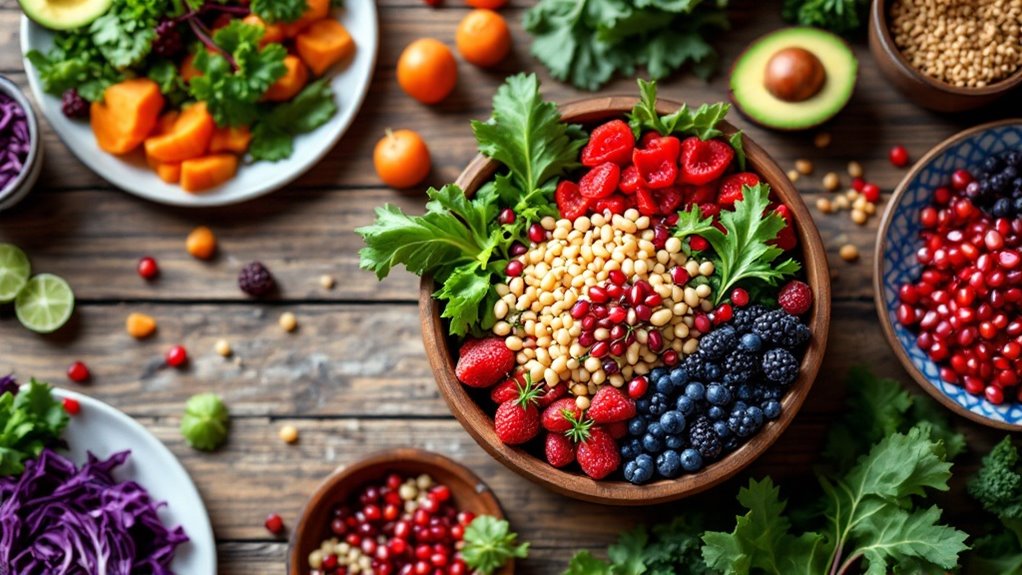
Adopting a plant-based diet can considerably reduce your cancer risk through several powerful mechanisms. The phytochemicals and antioxidants found in fruits and vegetables actively fight cancer cell growth, while dietary fiber helps regulate your body's insulin levels and supports gut health.
Plant foods fight cancer through antioxidants and fiber, naturally defending your body while supporting healthy insulin and digestion.
Plant-based foods also reduce inflammation throughout your body, which plays an essential role in preventing various types of cancer. While a vegan diet may seem restrictive, red meat consumption has been directly linked to increased bowel cancer risk.
Beyond fighting cancer, plant-based diets showcase remarkable power in preventing and managing diabetes. You'll reduce your risk of type 2 diabetes by up to 62% when choosing vegan options, while improving blood sugar control if you're already managing the condition. Plant-based eating helps by increasing insulin sensitivity, reducing medication dependence, and protecting your cardiovascular health. The gut microbiome benefits from vegan diets promote improved metabolic health and reduced disease risk.
| Benefit | Vegan Diet | Standard Diet |
|---|---|---|
| Diabetes Risk | 62% lower | Baseline |
| HbA1c Reduction | 1.23 points | 0.38 points |
| Med Reduction | 43% of patients | 26% of patients |
| Weight Loss | 11 lbs average | Varies |
| Heart Protection | 21-22mg/dL LDL drop | Minimal change |
These impressive results stem from vegan diets' naturally lower fat content, higher fiber, and ability to reduce insulin resistance through whole plant foods.

The environmental impact of your food choices extends far beyond your plate, with vegan diets markedly reducing agriculture's strain on our planet.
By choosing plant-based foods, you'll help conserve essential resources and protect ecosystems worldwide. A vegan diet requires 75% less agricultural land and saves thousands of liters of water compared to animal-based foods. The transition to plant-based eating can reduce food-related emissions by up to 75% compared to conventional diets.
These sustainable choices protect our forests, conserve water, and help combat climate change through reduced greenhouse gas emissions.
While plant-based eating revolutionizes sustainable agriculture, your vegan choices can also power up your body's natural defense systems. A plant-based diet activates antiviral pathways within two weeks and delivers 20-40% more antioxidants than standard Western diets, strengthening your immune response. Recent research shows that a vegan diet composition of 10% fat content helps optimize the body's innate immunity functions. Keelung Night Market showcases how traditional Taiwanese street food can be adapted into immune-boosting vegan delights. The vibrant Portuguese capital offers numerous plant-based restaurants that combine immune-strengthening ingredients with traditional Mediterranean flavors. Bangkok's vegan street food scene provides an excellent example of how traditional Asian cuisine can support immune health naturally. Taipei's plant-based scene demonstrates how Asian metropolises are embracing immune-boosting vegan alternatives.
| Immune Boosting Component | Benefit |
|---|---|
| Antioxidants | Neutralize harmful free radicals |
| Plant Fibers | Enhance gut microbiome diversity |
| Phytonutrients | Boost white blood cell activity |
| Anti-inflammatory compounds | Reduce systemic inflammation |
You'll experience a 30% boost in gut microbial diversity and reduced inflammation markers, as plant-based foods naturally lower pro-inflammatory cytokines by 15-25%. The combination of high-fiber intake and phytonutrients supports your body's first-line defense mechanisms, while increasing beneficial gut bacteria that strengthen your intestinal barrier.

Making compassionate food choices transforms your daily meals into powerful acts of kindness, since every plant-based dish you select helps reduce animal suffering and environmental destruction.
By choosing vegan options, you're directly decreasing the demand for factory farming, where over 1.2 billion land animals face extreme confinement and cruel practices annually in the UK alone. Your food choices also protect wildlife and ecosystems threatened by livestock grazing and deforestation. Philadelphia's diverse vegan options continue to expand as more restaurants embrace plant-based cuisine. Exploring plant-based alternatives like cashew cheese and almond milk makes transitioning away from animal products easier than ever. Many popular snacks and foods are accidentally vegan and can make the transition even more enjoyable. Georgetown's vibrant vegan food scene offers countless delicious options for those seeking plant-based cuisine. New York City's savory delights showcase how diverse and satisfying vegan cuisine can be.
When you align your meals with compassionate values, you're contributing to a movement that promotes non-violence and environmental stewardship while rejecting industries that profit from animal exploitation.
You'll actually save money on a vegan diet, spending about $90 monthly versus $168 for meat-based diets. You can reduce costs further by choosing whole foods over processed alternatives and buying in bulk.
You will discover vegan spots using apps like HappyCow and Vanilla Bean. Major cities like London, Berlin, and Portland offer numerous options, while local markets and vegetarian restaurants can provide plant-based alternatives worldwide.
You can bring portable vegan dishes like hummus, lentil pâté, or fruit skewers to share. Request plain sides before toppings are added, and opt for plant-based alternatives in familiar dishes like chili or pasta.
Like breaking free from any habit, you'll need patience. Try plant-based alternatives like tofu scramble for eggs or cashew cheese. Stay hydrated, identify emotional triggers, and remember your "why" when cravings hit.
Yes, you can safely raise children and maintain pregnancy on a vegan diet. You'll need to carefully plan nutrients, take supplements (especially B12), and work with healthcare providers to monitor nutritional needs regularly.
You've discovered how a vegan lifestyle isn't just about loading up your iPhone with plant-based recipes – it's a powerful choice that impacts your health and the planet's future. By embracing plant-based eating, you're taking control of your wellness while contributing to environmental sustainability. Whether you're motivated by health benefits, environmental concerns, or ethical considerations, going vegan is a meaningful step toward a better world for everyone.